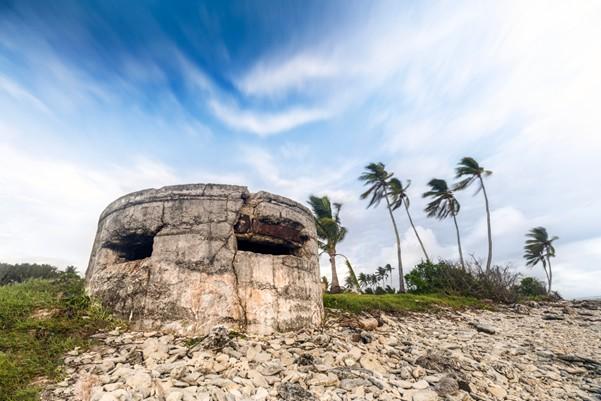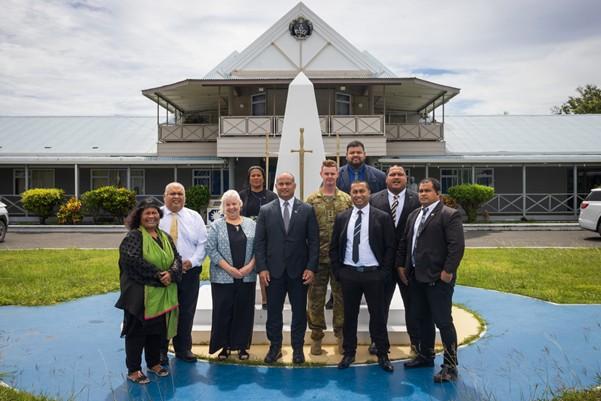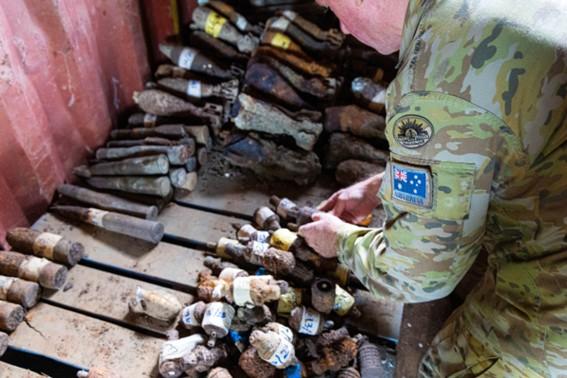Facts and figures
| Total military expenditure | $USD 0.00 billions |
The ‘Know Your Region’ series is designed to support unit and individual professional military education on the Indo-Pacific region. It’s important for all serving members of our military to have a foundational knowledge of the countries and issues in the Indo-Pacific.
On this page:
- A short history
- Cooperation with Australia
- Nauru police force
- Exclusive Economic Zone (EEZ)
- Regional Cooperation
A short history
Nauru was first annexed by Germany in 1888 as part of its colonial ambitions in the Pacific. With the outbreak of World War I in 1914, Nauru’s geopolitical importance increased due to the discovery of phosphate. Australian forces, acting on behalf of the British Empire, occupied the island in November 1914. The occupation was part of a broader campaign to take over German possessions in the Pacific. Following the war, Nauru was officially transferred from German control to Australia, Britain, and New Zealand through a League of Nations mandate.
During WWII, due to its rich phosphate deposits, Nauru again became a target. In December 1940, the island was attacked by German surface raiders, which shelled phosphate installations and infrastructure. Though there was no land invasion at the time, the attack demonstrated Nauru’s vulnerability in wartime.
In August 1942, the Japanese Imperial Army invaded and occupied Nauru. The island became a military outpost with airfields and military installations to support Japanese operations across the central Pacific. The Japanese deported over 1,000 Nauruans to forced labour camps in Truk (now Chuuk, Micronesia), where 463 died from malnutrition and disease.

Nauru – Japanese Outpost – Defence Images
The island was liberated in 1945, and Australian forces re-established control. The traumatic experiences of World War II have left a lasting impact on Nauruan society.
After World War II Nauru was placed under a United Nations trusteeship, administered by the same three countries with Australia playing the dominant role. There was no establishment of a national military force during this period. Instead, administrators relied on local police and an external military presence to meet security requirements.
World War 2 Relics & Remains | Nauru
Following independence in 1968, Nauru did not form a military due to its small size and limited population. Instead, the Nauru Police Force was tasked with maintaining internal order while external Defence continued informally with Australia.

Australian High Commissioner to Nauru and Australian contingent commander meet with Government of Nauru officials during Operation Render Safe. – Defence Images
Today, Nauru has no armed forces or military budget. Instead, the country relies on strong bilateral partnerships, chiefly with Australia, and participation in regional frameworks.
Cooperation with Australia
In December 2024, the Australian-Nauru Treaty was signed. In exchange for financial support, including training the Nauru’s Police force, Australia was granted veto powers over Nauru’s future security, telecommunications, and infrastructure agreements with third countries. While this treaty does not establish a formal military presence, it reaffirms Australia’s role in ensuring Nauru’s defence and security.

Image – Explosive Remnants of War (ERW) found on the Island of Nauru, ready for disposal during Operation Render Safe (2024). Defence Images
Nauru Police Force
The Nauru Police Force sits under the Ministry of Justice and Border Control. It consists of a few hundred officers that perform domestic law enforcement, border management, and limited maritime surveillance. The force includes a Community Policing Unit, Drug Enforcement Unit, and a small Maritime Unit. Australia, New Zealand, and regional organisations have provided training, equipment, and infrastructure support. Nauru is also part of the Pacific Islands Chiefs of Police (PICP) network and engages in joint regional training exercises.
The Australian Federal Police (AFP) has a partnership with the Nauru Police Force through the Nauru-Australia Policing Partnership (NAPP) program. NAPP assists with transnational crime and border security, operations capability, training, infrastructure, and corporate reform.
Exclusive Economic Zone (EEZ)
Nauru’s Exclusive Economic Zone (EEZ) covers over 300,000 square kilometres of ocean, making maritime security a significant concern. The government has relied on regional mechanisms such as the Pacific Islands Forum Fisheries Agency (FFA) and international partnerships for maritime patrols. This includes regular surveillance flights and ship-based patrols conducted by Australian, New Zealand, and U.S. forces to help combat illegal and unregulated fishing in Nauru’s waters.
Regional Cooperation
Nauru contributes to and benefits from regional security cooperation under the Pacific Islands Forum (PIF). The Biketawa Declaration (2000) and the Boe Declaration (2018) expanded the regional security agenda to include human security, climate resilience, and cyber security. Nauru has also participated in regional disaster response exercises and receives logistical support from partners during times of crises, such as cyclones or droughts.
The growing geopolitical competition between China and Western countries has affected security dynamics in the Pacific. Nauru’s decision in early 2024 to switch diplomatic recognition from Taiwan to the Republic of China reflects a broader trend of shifting alliances among Pacific nations. This dual alignment raises questions about sovereignty and long-term strategic autonomy. While Australia provides essential support and acts as a security guarantor, China’s interest in infrastructure, trade, and deep-sea mining presents economic opportunities.
For further information on Nauru’s military capability and security, see the resources below:
Video:
Articles
- Australian Federal Police (AFP) – The Government of the Republic of Nauru
- Mystery surrounds suspension of Nauru police commissioner during detention centre unrest – ABC News
- Nauru, Australia sign security treaty, enhance ties – Australia Pacific Islands Business Council
- Rendering Nauru safe | Defence
Know your region
Know Your Region series gives you a shortcut to understanding other nations in the Indo-Pacific region.









